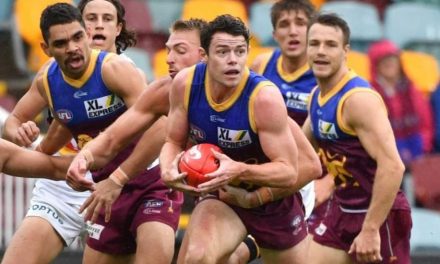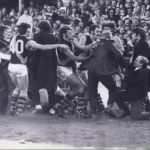(Top left): An early Blues-Pies clash. (Bottom): Port Adelaide’s sixth flag in a row. (Right): Eddie McGuire and Colin Carter.
WHY does Australian football behave like someone trying to hide a stint of youth detention?
When Collingwood “squared” the ledger with Carlton on August 30 this year at 127 wins apiece (with four draws), the VFL-AFL record books were ignoring the first five years of the inner-Melbourne football rivalry.
The Carlton-Collingwood counter should not start from June 22, 1897 when the Magpies beat the Blues on Princes Park by six points in their first VFL encounter.
The feud began at Victoria Park on May 7, 1892, with Collingwood’s first official game – and first loss in a premiership competition, 3-2 to Carlton.
But that was the Victorian Football Association (established 1877), not the Victorian Football League (founded 1897).
In VFA company, from 1892 to the split at the end of 1896, Collingwood had an 8-4 win-loss advantage on Carlton, making the official derby counter between the clubs 135-4-131 in the Magpies’ favour.
It is surprising Collingwood president Eddie McGuire has not hit on this flattering count – although his club eagerly honours its first and only VFA premiership side, with the 1896 team photo in a superb frame and prime position on the walls of the Collingwood Football Club boardroom.
But McGuire will not have that 1896 flag counted in the game’s official tally of club premierships. It is all from 1897, the inaugural season of the VFL that was rebadged the Australian Football League (AFL) in 1990 (another Collingwood premiership year).
It is symbolic of how Australian football picks and chooses what to acknowledge and what to ignore. It’s part of the maddening airbrushing of Australian football history. And it is doing a disservice to the game.
It claims to have the world’s oldest football club, Melbourne – founded on August 7, 1858 (although the English now will counter with Sheffield Football Club, October 24, 1857).
Yet, there is a reluctance to acknowledge and honour the pioneer era from the start of the South Australian Football Association (now SANFL) and VFA in 1877.
The casting aside of achievements from 1877-1896, such as Collingwood’s first eight wins against Carlton, is a dishonour to the Australian game’s soldiers from two significant decades in the sport’s story.
It is wrong, just as it would be incorrect to endorse those who want the AFL premiership tallies reset from 1987 when the VFL started its national expansion with the entries from Perth (West Coast) and Brisbane (Bears).
Or to accept South Australian football great Andrew Jarman’s push to rebadge the Brownlow Medal, arguing the trophy, while it carries Charles Brownlow’s name, is a VFL (read as Victorian) award that needs an AFL national image.
Again, more airbrushing that wipes away the history of the game when most other sports would crave to have all the glorious dust, tradition and legends dating back to the 19th century.
English football did not bury its past when the game was recast with the “Premier League” on February 20, 1992.
Manchester United and Manchester City did not change the record books to have them recognise only the matches played from 1992, as Collingwood and Carlton have done with the 1897 start date for the counter to their derby.
American football did not discard the records from the once opposing National Football League (1920) and American Football League (1960) before the merger that created the first Super Bowl in 1969. The New York Giants still acknowledge all their trophies from 1925.
Geelong president and former AFL Commissioner Colin Carter would do the same with Australian football. He first proposed such in 2011 and came back with a second salvo last year for the game to recognise, acknowledge and honour all its achievements from 1870.
The push back, led by McGuire, who labelled Carter’s submission as “ridiculous”, sadly became centred on envy.
The premiership tallies would change with Carlton having its honour count rise from 16 to 22. Essendon would embrace its four VFA titles and have 20 crowns rather than 16. Geelong, Collingwood, Melbourne, South Melbourne-Sydney and Fitzroy-Brisbane also would celebrate more premiership anniversaries.
And in Adelaide, Port Adelaide (established 1870 and elevated to the AFL in 1997) would make the case to recognise its SANFL titles, in particular the six-in-a-row achieved from 1954-1959, when club patriarch Fos Williams and his Melbourne counterpart Norm Smith imagined the possibilities of a national Australian football competition.
It is disrespectful to the game’s pioneers that their achievements that established today’s national game on a grand foundation to become “Australia’s Game” – as the AFL puts it in the promotional packages – are being ignored because bragging rights on premierships are at stake.
PLEASE HELP US CONTINUE TO THRIVE BY BECOMING AN OFFICIAL FOOTYOLOGY PATRON. JUST CLICK THIS LINK.
It is petty – and repeats the same destructive pettiness created in the 1920s by the VFL that initially, even after the great split at the end of 1896, ensured its clubs kept possession of their historical achievements from the 19th century.
“Our records at the moment start in 1897 when the VFL began; they are silent on what happened before that,” Carter says.
“But that was not the case with those who founded the VFL in 1897 – for three decades they regarded the years before 1897 as part of their history. All the VFL records up to 1925 recognised their competition from 1870.”
Season 1925 marks the second great breakaway from the VFA, with Footscray, Hawthorn and North Melbourne moving to the VFL to form the 12-team competition that developed national ambitions from 1982 with the relocation of the bankrupt South Melbourne Football Club (established 1874) to Sydney.
“We should embrace the game’s history, just as the VFL founders did themselves from the late 1890s,” says Carter.
The AFL Commission in 2016 left Carter’s paper unresolved. Some might say it sidestepped the debate to leave the questions posed by Carter in the “too hard” basket. The commission ultimately declined to amend its league records, but it did endorse the 18 AFL clubs doing as they wished with their books.
The then AFL Commission chairman Mike Fitzpatrick declared: “Each club will have the option to decide how it will recognise its history across VFA/VFL or SANFL for Port Adelaide and AFL.”
Port Adelaide quickly acknowledged its story included 34 South Australian titles before it became the first non-Victorian club to rise from suburbia to the national AFL in 1997.
Club chief executive Keith Thomas says: “As a club we have always valued each one of our premierships, either at SANFL or AFL level, in the same way.
“No one premiership is held in more esteem than the other. Each one of our 37 flags (36 in the SANFL) played an equally important role in where our club is today. They are all a vital part of our club’s enviable history.
“For that we are very proud, and it’s pleasing that the AFL has allowed all clubs to formally acknowledge their premierships outside of the VFL-AFL competition.”
Port Adelaide is celebrating, amid COVID restrictions, its 150th anniversary this season with the club taking pride in all its heroes and achievements – including four Champions of Australia titles from 1890, 1910, 1913 and 1914, when it beat VFL premiers for Australian crowns.
Many sports would crave any opportunity to tell these stories, rather than hide them, as Australian football is doing by seeking to start every record book at 1897, the VFL foundation date.
Carter has not given up. He is strengthening his case by engaging researcher-historian Mark Pennings, author of the multi-volume “Origins Of Australian Football”, to put fact to a debate repeatedly trampled by emotion built on damaging envy of premiership tallies.
In a recent note from Carter, he wrote: “I have had Mark Pennings do some more work on the early VFL, and he has turned up so much evidence that the early VFL viewed 1870 as their starting date (not 1897). Nearly 100 references. (It is) now irrefutable.”
Carter also emphasises his campaign is to give Australian football’s biggest competition the appropriate start date – and not a fight on which premierships to count for bragging rights.
“The discussion of each club’s history (such as Port Adelaide) is different to the issue of when did the AFL-VFL competition begin,” Carter says. “Our argument has been mostly not to do with premierships, but rather when did our competition begin.
“The conclusive evidence is that the VFL’s founders viewed their own competition as having started in 1870. Then, several decades later, the story changed. Footy politics took its toll.”
And so many great football legends were airbrushed away.
This debate is far more than just premierships. Or bragging rights in derbies between Collingwood and Carlton.
It is about telling the full story of Australian football, from the start in 1858 – and not just from May 8, 1897, when at 3pm on a Saturday, Carlton, Collingwood, Essendon, Fitzroy, Geelong, Melbourne, South Melbourne and St Kilda started the chase for the first cache of VFL premiership points.
There is no doubt that that record-keeping becomes challenged. But if English football clubs can do it – with so much change in their competitions – why can’t Australian football?
Why is the beauty of learning and honouring the heroes of the game’s pioneer era scarred by petty jealousies on premiership counts?
If it is good enough for McGuire and his Collingwood board to pay homage to their club’s 1896 VFA premiership team, all of football should recognise, promote and honour all that was achieved in Australian football from 1858-1897.
Every other sport in the world would do such.
Clearly, with the COVID pandemic creating enormous challenges for the AFL Commission, Carter’s new submission to revisit the early history of the game will fall behind other pressing priorities.
But there is that sage thought that you cannot find your future if you ignore your past. Australian football has to stop ignoring its foundation era before the VFL was formed in 1897.













Research?
In fact Carlton championed Brittania’s application to join the VFA.
Carlton delegate Jack Melville spoke at VFA meetings on behalf of Brittania.
When Brittania was accepted into the VFA as Collingwood in 1892 it was found that they had organised 17 games, one short of being able to compete for the premiership. Carlton cancelled its match against Ballarat and played Collingwood in its first game on May 7th.
This was played at Victoria Park and was infact a Carlton home game.
Carlton donated all gate takings to the new club.
The local crowd cheered the Blues on to the ground for their generosity.
Carlton won the match, 3.13 – 2.11
In 1897 when Carlton’s home ground Princes Park opened, the first match played was against Collingwood.
Both teams were on good terms until 1910.
A good reference is blueseum.org which has details on every Carlton player and game played since 1864.
Where does the WAFL sit in all this?
Well done & thanks again ,Rucch !